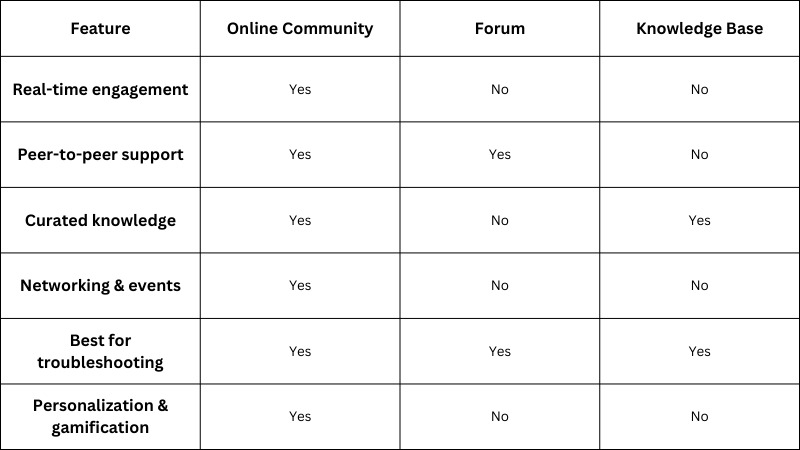Choosing the right platform for customer engagement and knowledge sharing can be challenging. Online communities, forums, and knowledge bases all serve different functions, yet they are often mistaken for one another.
For organizations looking to build engagement, improve support, and foster collaboration, understanding the differences between these platforms is essential. Each has unique benefits and limitations, and selecting the right one depends on your goals.
This guide explains the key differences between online communities, forums, and knowledge bases, detailing their purpose, advantages, and best use cases.
Understanding Online Communities, Forums, and Knowledge Bases
At their core, these three platforms serve different objectives:
- Online Communities – A dynamic space for discussions, engagement, and networking. They integrate multiple content types, including events, blogs, and resources.
- Forums – A structured discussion board where users ask and answer questions, primarily in a Q&A format.
- Knowledge Bases – A self-service repository containing structured and verified information for quick problem-solving.
Each platform plays a role in customer engagement, self-service support, and knowledge management. However, they are not interchangeable.
What is an Online Community?
An online community is a structured platform where people gather to discuss topics, share insights, and engage with a brand or organization. Unlike forums, which primarily serve as Q&A spaces, online communities integrate multiple engagement tools, including discussions, blogs, gamification, and networking opportunities.
Key Features of Online Communities
- Discussions and content sharing – Members participate in discussions, share best practices, and contribute insights.
- Networking and events – Virtual meetups, webinars, and in-person gatherings strengthen community connections.
- Personalization and engagement tools – AI-powered recommendations, gamification, and user-generated content encourage participation.
- Resource libraries – Many communities incorporate a knowledge base for structured content alongside user discussions.
- Data insights and analytics – Organizations gain valuable insights into user engagement and preferences.
Advantages of Online Communities
- Strengthens brand loyalty – Engaged members become long-term advocates.
- Encourages peer-to-peer support – Reduces customer support burden.
- Creates an interactive knowledge-sharing environment – Users exchange insights and experiences.
- Enhances long-term engagement – Continual discussions keep users involved.
Challenges of Online Communities
- Requires dedicated management – Moderation and engagement strategies are needed.
- Takes time to establish – Building an active community requires consistent effort.
- Requires content planning – Maintaining valuable discussions and resources is essential.
Best Use Cases
- Organizations looking to create lasting relationships with customers or members.
- Brands that want to combine discussions, knowledge sharing, and engagement tools.
- Businesses aiming to encourage networking and advocacy.
What is a Forum?
A forum is a digital discussion board where users post questions and share answers. Unlike online communities, forums are primarily focused on peer-to-peer knowledge sharing and troubleshooting.
Key Features of Forums
- Threaded discussions – Users post questions, and others respond.
- Asynchronous communication – Conversations unfold over time.
- Peer-generated knowledge – Users contribute answers based on experience.
- Moderation controls – Admins manage discussions and enforce rules.
- Searchable archives – Past discussions remain accessible.
Advantages of Forums
- Effective for troubleshooting – Users help each other solve issues.
- Provides scalable self-service support – Reduces reliance on direct customer support.
- Retains knowledge over time – Discussions are searchable for future reference.
Challenges of Forums
- Limited engagement beyond Q&A – Lacks broader content formats found in online communities.
- Disorganized content – Unlike a knowledge base, forum discussions can be unstructured.
- No guaranteed accuracy – Information comes from users rather than verified sources.
Best Use Cases
- Businesses looking to create a self-service support space for customers.
- Organizations that need a cost-effective Q&A platform for troubleshooting.
- Brands that want a user-driven support model without requiring extensive content creation.
What is a Knowledge Base?
A knowledge base is a structured repository of official documentation, designed to provide quick and reliable answers to common questions. Unlike forums, which rely on user-generated content, knowledge bases are curated and maintained by the organization to ensure accuracy.
Key Features of Knowledge Bases
- Structured articles and guides – Content includes FAQs, how-to guides, and troubleshooting steps.
- Searchable format – Users find information quickly through keyword searches.
- Company-verified content – All materials are reviewed for accuracy.
- Multilingual support – Many knowledge bases support multiple languages.
- Self-service efficiency – Customers find answers without contacting support.
Advantages of Knowledge Bases
- Provides consistent, accurate information – Unlike forums, all content is verified before publishing.
- Reduces customer support workload – Self-service resources improve efficiency.
- Improves onboarding and training – Employees and customers can access structured learning materials.
- Easier to maintain than forums – Content is updated systematically.
Challenges of Knowledge Bases
- No real-time engagement – Lacks the interactive elements of forums and communities.
- Limited peer-to-peer learning – Users rely on written content rather than discussion.
- Requires ongoing updates – Information must stay current and relevant.
Best Use Cases
- Companies that need a structured knowledge repository for FAQs and troubleshooting.
- Organizations looking to reduce support requests with self-service resources.
- Businesses that require official documentation for customer and employee training.
Comparison: Online Communities vs. Forums vs. Knowledge Bases

Choosing the Right Platform
Each of these platforms serves a unique role in customer support, engagement, and knowledge management. The right choice depends on your organization’s goals:
- Choose an online community if you want to foster deep engagement, encourage networking, and integrate multiple content types beyond Q&A.
- Choose a forum if you need a self-service discussion space where users answer each other’s questions.
- Choose a knowledge base if your priority is to provide structured, official documentation for customer support.
Integrated Approach
For organizations seeking comprehensive engagement and support, the best approach is to combine all three:
- A knowledge base for official documentation.
- A forum for user-driven discussions.
- An online community for engagement, networking, and brand advocacy.
Bevy provides a platform that integrates these elements, allowing organizations to build thriving communities that scale support, engagement, and advocacy.
Final Thoughts
Understanding the differences between online communities, forums, and knowledge bases helps organizations make informed decisions about their engagement strategy. Whether the goal is customer support, peer-to-peer collaboration, or content-driven engagement, selecting the right platform is essential for success.

